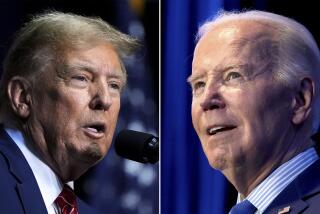2 Upstart States Try to Upset the Election-Year Apple Cart : Politics: Louisiana and Delaware challenge Iowa, New Hampshire. GOP candidates join feud over February plans.
- Share via
Like a well-rehearsed game of follow the leader, America’s 50 states have accepted their place on the presidential campaign trail: First comes Iowa, then New Hampshire, before any other gets a turn.
It’s a time-honored and pivotal pecking order, despite being arbitrary and largely self-anointed. By authority of lawmakers in their respective states, the Iowa caucus (set next year for Feb. 12) and the New Hampshire primary (scheduled for Feb. 20) are entitled to first-in-the-nation status--as surely as if it were writ in stone.
But two impudent upstarts, Louisiana and Delaware, are fuddling the 1996 nominating season by daring to introduce a game of their own: Eager for recognition and influence, they have leapfrogged to the head of the pack, igniting a spat among Republican leaders that has all the decorum of a playground brawl.
At stake is a powerful infusion of money and prestige. Every four years, the economies of Iowa and New Hampshire reap millions of dollars from campaign coffers. Media coverage is extensive, the publicity free. And the two small states--whose clout would otherwise be negligible--enjoy a disproportionate say in the nation’s most important political event.
“It’s almost as though Iowa and New Hampshire have succeeded in implanting in all of our minds this mantra that they come first, like some God-given pronouncement from the mount,” said Larry Sabato, a political science professor at the University of Virginia. “They’ll fight to the death to keep what they have, even though they don’t particularly deserve it.”
Any challenge to that duopoly is viewed as sacrilege; recently, it has caused several GOP White House contenders to attack one of their rivals, Texas Sen. Phil Gramm, as disrespectful of Iowa and New Hampshire because he has dared woo the outlaw states.
Denouncing Louisiana’s Feb. 6 caucus as an “illegal and inappropriate charade,” GOP officials in Iowa set today as a deadline for candidates to sign a pledge to steer clear of the Bayou State.
The race’s front-runner, Senate Majority Leader Bob Dole, proudly embraced the pledge Tuesday. And the news release announcing his decision pointedly noted that Gramm has refused to do so, an act the Dole camp termed a “snub.”
New Hampshire Republican leaders have similarly demanded a boycott of Delaware’s Feb. 24 primary, even though its only sin is that it comes less than a week after New Hampshire’s day in the sun. That proximity, according to the view from New Hampshire, will distract candidates from time better spent in the Granite State.
Should those efforts fail to condemn Louisiana and Delaware to electoral irrelevance, the governors of both Iowa and New Hampshire have threatened to set their 1996 voting dates even earlier--a move that could spark yet another game, which might be called political chicken.
The glow of the starting gate has lured not just Louisiana and Delaware. At least a dozen other states, including California, have advanced their primary dates since 1992. Most have kept a respectful distance behind Iowa and New Hampshire, but it still adds up to what pundits call the most front-loaded presidential season on record, with nearly 70% of GOP convention delegates scheduled to be selected in just 50 days.
“It’s like an arms race,” said Walter Dean Burnham, a University of Texas political scientist. “We may find ourselves having these things on July 4--of the year preceding the election.”
Iowa and New Hampshire, not surprisingly, consider themselves uniquely qualified to serve as the twin guardians of the campaign’s opening.
Although their demographics don’t fully reflect the country’s diversity, voters in those early contests tend to be motivated participants, honoring their civic duty with a solemnity not often found in other elections. Moreover, the two states don’t have huge urban centers to penetrate, giving candidates an opportunity to practice “retail politics,” highlighting their face-to-face skills at backyard barbecues and kaffeeklatsches.
“Until someone tells us why we shouldn’t be first--that we’re not doing a good job--then why break with tradition?” asks Thom Levoie, a Manchester, N.H., Chamber of Commerce official.
But Rhett Davis, a Louisiana GOP strategist, wryly counters: “We consulted the Old and New Testaments, the U.S. Constitution and the Magna Carta--and nowhere does it say that Iowa and New Hampshire go first.”
The importance of New Hampshire’s primary is generally traced back to 1952, when President Harry S. Truman suffered a startling loss and, shortly thereafter, announced he would not seek reelection. Since then, every U.S. president, with the exception of Bill Clinton, has first won his party’s New Hampshire primary before making it to the Oval Office.
Iowa’s caucus first captured national headlines in 1976, when a relatively unknown ex-Georgia governor, Jimmy Carter, scored an upset victory.
Over the years, both events have attracted increasingly intense media coverage, heightening their perceived significance and, in turn, their real impact on the presidential race.
“I think there is a certain value in the notion that some smaller states ought to go first, so that less well-financed and less well-known candidates have at least a theoretical chance to break through,” said political analyst Charles Cook. “But with that value comes an arrogance, which understandably rubs other states the wrong way.”
From the perspective of Iowa Republicans, at least, Louisiana’s stampede to the front has nothing to do with wanting to share the glory enjoyed by the Hawkeye State. Instead, they blame the brouhaha on Gramm, who trails Dole in both Iowa and New Hampshire polls. Hoping to save his campaign from early jolts, they contend, Gramm allegedly engineered the revolt in Louisiana, where he had scored an impressive straw poll victory last January.
“Iowa’s first-in-the-nation status is as traditional as Christmas,” said Darrell Kearney, Dole’s Iowa campaign manager. “Like the Grinch who stole Christmas, Gramm is trying to steal Iowa’s first-in-the-nation status.”
Another GOP candidate, former Tennessee Gov. Lamar Alexander, came out this week with a 60-second radio attack on Gramm, entitled “Iowa Pledge.” “If a candidate won’t vote for Iowa,” the ad asks, “how can they expect Iowans to vote for him?”
Gramm, who also caught flak from New Hampshire Gov. Steve Merrill for attending Delaware’s GOP convention last spring, denies any hand in the leapfrogging. Trying to sound a conciliatory note, he has pledged to “continue to respect Iowa and New Hampshire’s first-in-the-nation status,” while still campaigning for delegates in Louisiana and Delaware.
“I’m like the guy in the movie ‘Field of Dreams,’ ” Gramm said. “If you build it, I will come.”
(BEGIN TEXT OF INFOBOX / INFOGRAPHIC)
Who’s Goes First?
More than just the candidates are at odds in the race for the 1996 Republican presidential nomination. Efforts by GOP leaders in Louisiana and Delaware to challenge the traditional status of Iowa and New Hampshire as the earliest testing grounds for White House contenders have sparked a nasty spat among the states.
CURRENT LINE-UP
*--*
LOUISIANA IOWA NEW HAMPSHIRE DEL. Date Tuesday, Monday, Tuesday, Saturday, Feb. 6 Feb. 12 Feb. 20 Feb. 24 Method Caucus Caucus Primary Primary GOP delegates 30 25 16 12 at stake
*--*
Drawings not to scale
More to Read
Get the L.A. Times Politics newsletter
Deeply reported insights into legislation, politics and policy from Sacramento, Washington and beyond. In your inbox twice per week.
You may occasionally receive promotional content from the Los Angeles Times.










